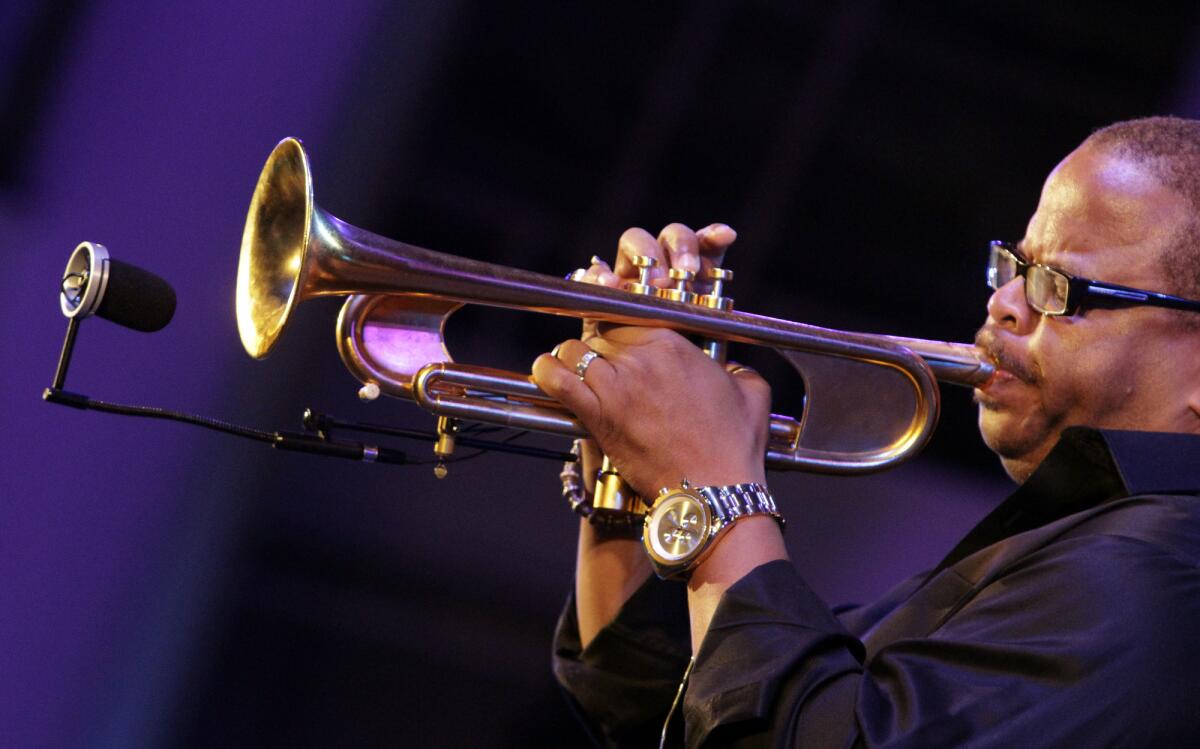Why the ‘BlacKkKlansman’ score could (and should) earn Terence Blanchard his first Oscar nod

One of the most arresting sequences in Spike Lee’s “BlacKkKlansman” — based on the true story of an African American cop who infiltrated the Ku Klux Klan in 1970s Colorado — comes right at the beginning of the movie.
It involves Alec Baldwin, as a fictional white supremacist academic, filming a kind of segregationist infomercial. As he delivers his increasingly hateful diatribe, images from D.W. Griffith’s notorious “The Birth of a Nation” are projected onto his face, eventually obscuring Baldwin almost entirely — a powerful visual metaphor for the way racism can span generations.
Yet part of why this juxtaposition plays is because the sequence employs a third element: the lush strings of Terence Blanchard’s music, which lends the scene a strangely moving quality seemingly at odds with what we’re seeing.
It’s a signature tactic in Blanchard’s work with Lee, which stretches back to the late ’80s, when the revered jazz trumpeter appeared on the soundtracks of “School Daze” and “Do the Right Thing”; since “Jungle Fever” in 1991, Blanchard has scored every one of the filmmaker’s many movies, including “Malcolm X,” “25th Hour” and “Inside Man.”
The device is there at the end of 2000’s “Bamboozled,” where a stirring orchestral theme accompanies an ugly montage of performers in blackface. And it’s there again as “BlacKkKlansman” closes with still-horrific footage from the deadly 2017 white nationalist rally in Charlottesville, Va.
In each instance, the pictures are telling a disturbing story that’s complicated, and ultimately deepened, by the beautiful music.
As crucial as his contributions to Lee’s movies are — emotionally, they’re up there with the director’s famous dolly shot — Blanchard has never won an Academy Award for original score. In fact, he’s never even been nominated, which feels almost as crazy as the fact that Lee has never received a nod in the director category.
Blanchard, 56, is philosophical about the lack of recognition.
“You never miss something you never had,” he said with a laugh over the phone this week from New York, where he had a gig as part of Winter Jazzfest with his group, E-Collective.
But I’m less understanding. Blanchard’s having been overlooked for more than two decades is downright inexcusable — a clear sign, one of so many, that too many Oscar voters are paying attention only where they want to. (Consider that while Blanchard was whiffing, John Williams racked up 21 nominations. Twenty-one!)
Fortunately, the drought could finally end this year. Blanchard’s “BlacKkKlansman” music is on the short list of 15 works being considered for the original score category; film academy members have until Monday to cast their ballots to narrow that group to the final slate of nominees set to be announced on Jan. 22.
If Blanchard does indeed make the cut, you could look at the nod as a de facto lifetime-achievement thing — the kind of belated honor that a show-biz organization will occasionally bestow to make up for years of neglect.
Last year, for example, the late Leonard Cohen won a Grammy for rock performance, of all things, after garnering scant notice from the Recording Academy during his most vital years.
And as a Blanchard admirer, I wouldn’t even mind that; the guy deserves praise in whatever form it might take.
But “BlacKkKlansman” is worthy of being singled out.
With its inventive use of electric guitar and its knowing echoes of American military music — particularly effective in a scene Lee borrows from “Gone With the Wind” — Blanchard’s score stands up easily next to the year’s other most interesting movie music, including Ludwig Göransson’s from “Black Panther” and Ben Salisbury and Geoff Barrow’s from “Annihilation.” (Both of those scores are on the Oscars short list, along with music from “Crazy Rich Asians,” “First Man,” “If Beale Street Could Talk,” “Mary Poppins Returns” and others.)
When I asked Blanchard about his trademark moments in “BlacKkKlansman” — those scenes where his stately music is reaching us in tandem with Lee’s starkly troubling images — the New Orleans native chuckled.
“Spike is a New Yorker,” he said. “And New Yorkers, they go about telling you what’s on their mind. They don’t hold back. But the thing I’ve come to understand about Spike, which admittedly took me a minute to grasp, is that he’s really a humanitarian.
“He’s trying to pull at heartstrings to change minds. In scenes like that, he’s saying, ‘Look at what one group of human beings is doing to another group of human beings. And based on what? The color of your skin? Where you’re from? Who you love?’ ”
According to Blanchard, the “overall thing” of Lee’s movies is “how we need to come together as people,” and his music is meant to help us along toward that realization.
Of the guitar, which plays a prominent role throughout the movie, the composer said it came from hearing blues bands in New Orleans and playing in pop bands in the ’70s.
But he also was drawn to the instrument to give “a sense of strength” to the main character, Ron Stallworth (played by John David Washington), who becomes the first black man to join the Colorado Springs Police Department.
“Remember when Jimi Hendrix played the national anthem at Woodstock?” Blanchard asked. “Come on, bro — that’s one of the most beautiful moments in musical history! For me, it’s like an African American dude screaming, ‘Yo, our people fought and died for this country just like everybody else.’”
I don’t think it’s too dramatic to say that Blanchard’s music for “BlacKkKlansman” strikes a similar note regarding the need to open up ideas of greatness in Hollywood.
Twitter: @mikaelwood
More to Read
The biggest entertainment stories
Get our big stories about Hollywood, film, television, music, arts, culture and more right in your inbox as soon as they publish.
You may occasionally receive promotional content from the Los Angeles Times.











